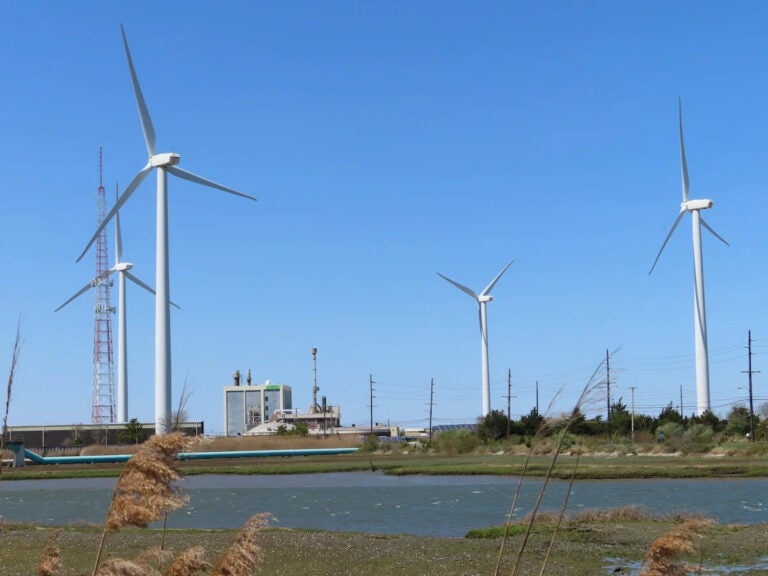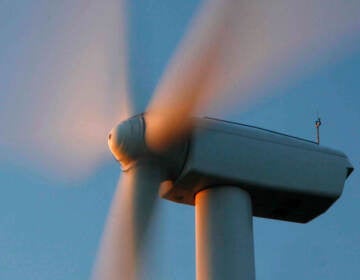Shell pauses N.J. offshore wind project as industry faces ‘high level of uncertainty’
The Atlantic Shores wind project was expected to start construction this year. The remaining developer says it’s still committed.
Listen 1:45
Land-based windmills turn in the wind in Atlantic City, N.J., on April 28, 2022. (AP Photo/Wayne Parry)
From Philly and the Pa. suburbs to South Jersey and Delaware, what would you like WHYY News to cover? Let us know!
Oil giant Shell is pausing its involvement in the Atlantic Shores wind project, which was expected to start construction off the coast of South Jersey this year and eventually produce enough electricity to power hundreds of thousands of homes.
The news is the latest blow to New Jersey’s offshore wind industry, which has struggled to get off the ground amid high interest rates and supply chain issues. It comes on the heels of President Donald Trump’s executive order halting new permits and leases for wind projects on federal lands and in federal waters pending agency review, and after the president said he hoped a wind farm planned off the Jersey shore would be “dead and gone.”
“The Trump administration has set a significant setback for offshore wind on a national basis,” said Tim Fox, an industry analyst at Clearview Energy Partners.
EDF Renewables, the other company developing Atlantic Shores, says it is still committed to the project.
“EDF Renewables believes Atlantic Shores’ projects can contribute to an ‘all-of-the-above’ American energy dominance strategy,” said spokesperson Sandi Briner in a statement. “Atlantic Shores projects are poised to provide urgently needed energy and jobs to the New Jersey economy and beyond within the American offshore energy industry.”
Following Shell’s quarterly earnings release Thursday, Bloomberg reported a Shell executive said the company is writing off a nearly $1 billion loss on the project and pausing its involvement.
“We have a sharp focus on performance, discipline and simplification,” said Shell spokesperson Natalie Gunnell in a statement. “When it comes to investment in wind, whether in the U.S. or elsewhere, we will focus on value maximisation in key markets where we have an advantaged position, and the macro context is naturally a key consideration.”
Gunnell said Shell continues to be 50% owners of Atlantic Shores with EDF Renewables. She declined to comment on whether Shell is seeking to monetize its stake.
Atlantic Shores has already received federal approval for its construction and operations plans. In an October press release, an Atlantic Shores Offshore Wind executive said the approvals meant the project could begin construction in 2025. Power from part of the Atlantic Shores project is expected to help New Jersey meet its goal of 100% clean energy by 2035.
Following the news of Shell’s decision, Gov. Phil Murphy said he remains committed to advancing his clean energy priorities.
“New Jersey will explore all available options to protect the health of our environment and residents while bolstering energy independence, creating good-paying American jobs, lowering energy bills, and growing New Jersey’s innovation economy,” he said in a statement.
But now there’s a “high level of uncertainty” about whether Atlantic Shores will ultimately advance to the construction phase, Fox said.
Despite having approvals in hand, the project could still be affected by Trump’s permit freeze, said Kris Ohleth, director of the Special Initiative on Offshore Wind, a think tank that supports offshore wind development.
“Even when projects are technically fully permitted, it’s almost unheard of for a major infrastructure project like an offshore wind project to not have to go back to a federal regulator for some type of adjustment to their permits,” Ohleth said. “If that regulator is not open for business, which it sounds like is the case with this executive order, then they’re putting a lot of risk in starting construction of a project.”
The Trump Administration could also imperil wind projects under development by choosing not to defend offshore wind lease sales and other federal approvals from lawsuits, Fox said. Groups have filed multiple suits challenging Atlantic Shores’ approvals — the latest being filed earlier this month.
“The Biden administration has vigorously defended those actions when challenged in court,” Fox said. “The Trump administration may be unlikely to vigorously defend those decisions in court.”
The opposition to offshore wind projects has centered around concerns about it hurting tourism, endangering whales and harming fisheries. Scientists say they have not found evidence linking whale deaths to offshore wind farms, but are continuing to study the issue. A federal agency found Atlantic Shores is likely to “adversely affect” whales, but not seriously harm or kill them.
Shell is not the first company to pause or drop investments in offshore wind projects along the Jersey Shore. In 2023, Danish wind developer Ørsted pulled out of two planned projects off the coast of Atlantic City, citing supply chain issues, inflation and rising interest rates.
Shell’s move could be an example of what’s to come under the Trump Administration, as his executive order throws “a great deal of uncertainty into the system,” Ohleth said.
“[It’s] causing developers and other members on the commercial side of the house to be looking elsewhere, to be looking to Europe, to be looking to Asia, where the markets are more mature and there’s much less risk in the system,” she said.
Oceantic Network, a member organization representing the U.S. offshore wind industry, struck a more optimistic tone.
“Atlantic Shores, along with the broader American offshore wind industry, continues to move forward,” said spokesperson Luke Jeanfreau.

Get daily updates from WHYY News!
WHYY is your source for fact-based, in-depth journalism and information. As a nonprofit organization, we rely on financial support from readers like you. Please give today.






